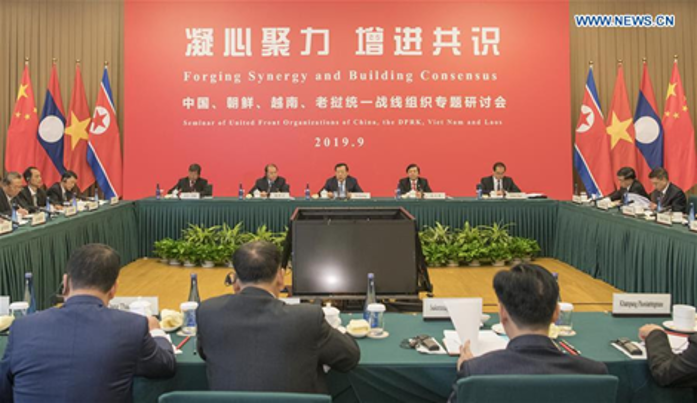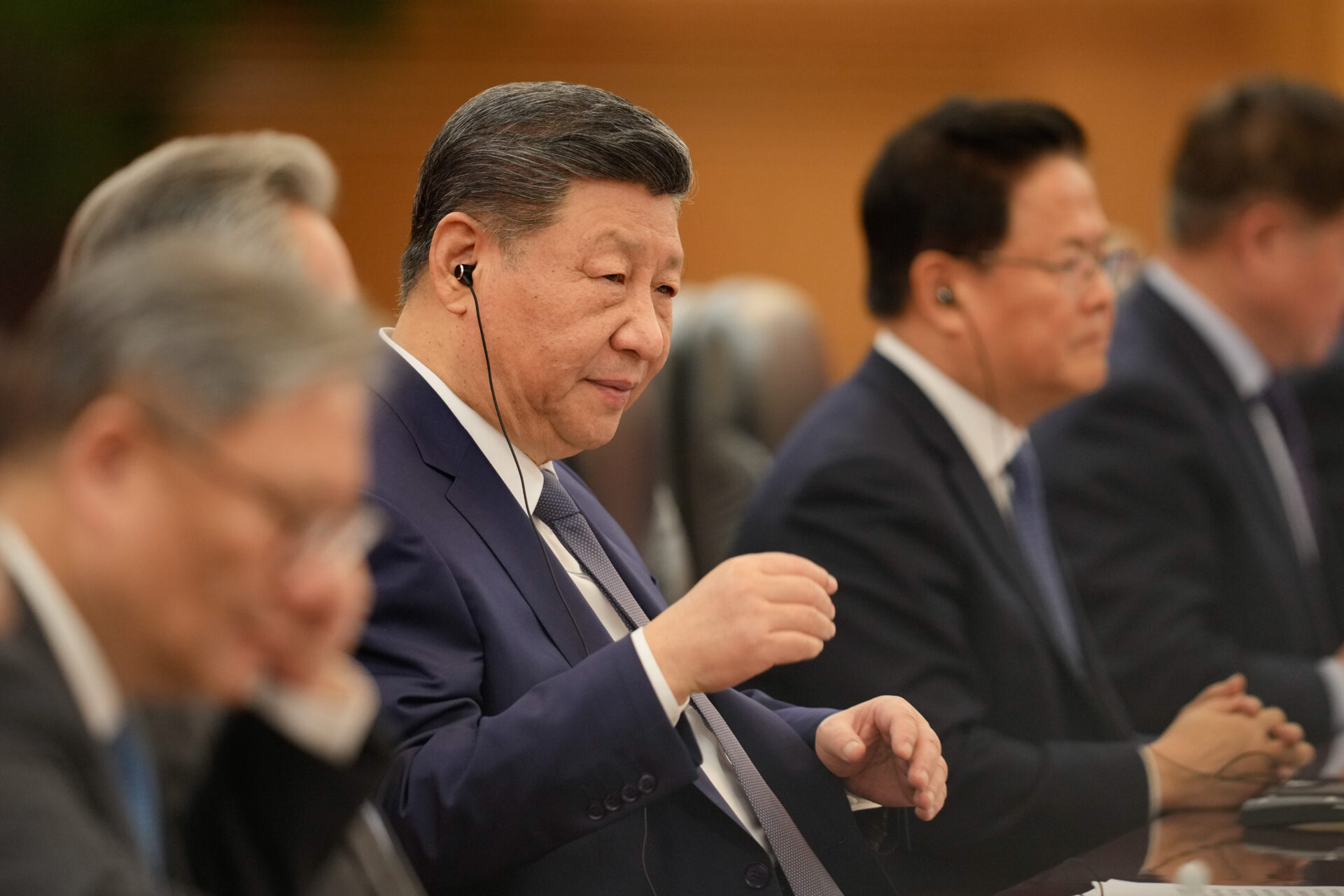
The United Front Work Department Assumes a Diplomatic Role
The United Front Work Department Assumes a Diplomatic Role
In the first week of September, a “United Front Organizations Special Symposium” (统一战线组织专题研讨会, Tongyi Zhanxian Zuzhi Zhuanti Yantaohui) was held in Beijing. Under the official slogan of “Forging Synergy and Promoting Consensus” (凝心聚力, 增进共识 / Ning Xin Juli, Zengjin Gongshi), this meeting brought together representatives from the united front branches of all four of Asia’s remaining Communist party-states: the People’s Republic of China (PRC), North Korea, Vietnam, and Laos. Official PRC media coverage praised the event as an opportunity for these united front organizations to “strengthen relations [and] closely cooperate to pursue a brighter future for socialist countries” in Asia (People’s Daily, September 5). [1] [2]
The September 4 conference was hosted by the Chinese People’s Political Consultative Conference (中国人民政治协商会议, Zhongguo Renmin Zhengzhi Xieshang Huiyi), or CPPCC. The CPPCC is a nominal advisory body—and actual propaganda forum—controlled and stage-managed by the Chinese Communist Party (CCP)’s own United Front Work Department (统一战线部, Tongyi Zhanxian Bu), or UFWD (China Brief, April 9). The event was chaired by CPPCC Secretary-General Xia Baolong (夏宝龙). It was also attended by Wang Yang (汪洋)—chairman of the CPPCC, and the member of the CCP Politburo Standing Committee who currently bears responsibility for the united front policy portfolio—who presented a speech and hosted a reception for the visiting delegates (CPPCC, September 5).
Following the conference, the three visiting delegations visited the city of Tianjin on September 5, and then returned to Beijing on September 6. In Tianjin, the delegations toured business and cultural sites intended to impress the visitors with the PRC’s economic and political achievements at a local level; and in each city they met with officials from the municipal-level political consultative conference (市政协, shi zhengxie). The visiting officials and CCP representatives discussed the structure and functions of these local organizations, as well as their role in “strengthening thought and political guidance” (加强思想政治引领, jiaqiang sixiang zhengzhi yinling) in Chinese society (Tianjin Daily, September 6; Beijing Daily, September 7).
A Potential New Role for the CCP United Front Work Department?
This unusual conference signaled an apparent further expansion of the roles currently exercised by the CCP UFWD. The UFWD has seen a steady expansion in resources, roles, and bureaucratic clout during the tenure of CCP General Secretary Xi Jinping (China Brief, April 24, 2018; China Brief, May 9, 2019). Within the PRC, the roles of the UFWD have traditionally been focused on co-opting and controlling social groups outside of the CCP, such as ethnic minorities and religious organizations. In areas beyond PRC authority, the UFWD’s efforts have largely focused on targeting Hong Kong and Taiwan, and seeking control of the overseas Chinese diaspora.
Historically, the CCP Central Committee International Department (中共中央對外聯絡部, Zhonggong Zhongyang Duiwai Lianluo Bu) has been the primary official channel for the CCP’s relations with other Communist parties—a role that has expanded in more recent years to include party-to-party relations across the political spectrum, in a host of countries throughout the world. [3] The International Department maintains this traditional role, but the UFWD may now be entering this realm, as well: specifically, by promoting its expertise in political co-optation and social control mechanisms, in order to build influence among regional Asian governments that share the PRC’s Leninist party-state organizational structure.
Official coverage of the September 4 conference indicated that the visiting delegates discussed means “to make achievements in the construction of socialism, under the leadership of each ruling party.” This was conducted under the rubric of two broad discussion topics: “the position and functions of the united front organizations in the national administration system of each country,” and “effective mechanisms and methods” for united front work. PRC representatives reportedly briefed the visiting delegates on their experience in multiple areas, including: strengthening party building and the CPPCC system; strengthening “ideological weapons” (思想理论武装, sixiang lilun wuzhuang); and strengthening the building of vaguely-defined “work mechanisms,” to include tools utilizing information technology (Renmin Zhengxie Bao, September 5).
Ideological Themes from the United Front Conference
PRC state media explicitly identified the conference as a follow-on event linked to the PRC-hosted Asian Civilizations Dialogue Forum (亚洲文明对话大会, Yazhou Wenming Duihua Dahui) held in Beijing in May 2019. The proceedings emphasized the political commonalities of the four officially Marxist-Leninist states, as well as striking a Pan-Asianist theme: host Xia Baolong told the delegates that not only did the party organizations of China, Korea, Vietnam, and Laos “possess similar functions,” but that the four countries were also “linked by mountains and rivers, are closely related by culture, and possess deep traditional friendships” (Renmin Zhengxie Bao, September 5).
As is now de rigeur for PRC media, official outlets also took the opportunity to play to Xi Jinping’s growing personality cult: invoking one of Xi’s favorite foreign policy slogans of a “common destiny for mankind” (人类命运共同体, Renlei Mingyun Gongtongti) (China Brief, July 16), state coverage declared that the event further contributed towards “producing new and greater accomplishments in constructing a community of common destiny for Asia, and a community of common destiny for mankind” (People’s Daily, September 5).
Conclusion
This early September conference of united front officials heralds a potential new diplomatic role for the UFWD in engaging with other Communist states. Although it fulfills a range of functions, the UFWD’s most central mission—like that of all CCP organs—is promoting the security of the regime. Less powerful and less-developed Communist states have solid reasons to look to the PRC as a model in terms of economic development. However, such states, which face problems of legitimacy and anxieties regarding future regime survival, may also look to the PRC as an attractive model of a Communist state that has achieved rapid economic growth without corresponding political change.
The mechanisms of domestic social co-optation and control employed by the UFWD may prove attractive to such regimes—and potentially, to other authoritarian one-party states interested in “strengthening political guidance” among their citizens. It remains to be seen whether the UFWD will continue to further develop this nascent diplomatic role with Communist states around China’s periphery—and perhaps, with other states further afield in the developing world.
John Dotson is the editor of China Brief. Contact him at cbeditor@jamestown.org.
Notes
[1] For a further discussion of the nature of united front work in Leninist regimes, and of the CCP United Front Work Department as a specific organization, see: Anne-Marie Brady, “On the Correct Use of Terms,” China Brief, Vol. 19, Issue 9 (May 9, 2019), http://jamestown.org/program/on-the-correct-use-of-terms-for-understanding-united-front-work/; and Alex Joske, “Reorganizing the United Front Work Department: New Structures for a New Era of Diaspora and Religious Affairs Work,” China Brief, Vol. 19, Issue 9 (May 9, 2019), http://jamestown.org/program/reorganizing-the-united-front-work-department-new-structures-for-a-new-era-of-diaspora-and-religious-affairs-work/.
[2] PRC press reporting indicated that the three visiting delegations were led by: Yang Chol Sik (North Korea); Nguyen Huu Dung (Vietnam); and Khambay Damlath (Laos) (Xinhua, September 4).
[3] For one historical discussion of the CCP ILD, and two that are more recent, see: U.S. Central Intelligence Agency, “The International Liaison Department of the Chinese Communist Party,” intelligence report dated December 1971 (declassified May 2007), https://www.cia.gov/library/readingroom/docs/polo-33.pdf; and David Gitter and Julia Bowie, “The Chinese Communist Party International Department: Advancing ‘One China’ Behind the Scenes,” Center for Advanced China Research, Sep. 28, 2016, https://www.ccpwatch.org/single-post/2016/09/28/The-Chinese-Communist-Party-International-Department-Advancing-One-China-Behind-the-Scenes; and Martin Hála and Jichang Lulu, “A New Comintern for the New Era: The CCP International Department from Bucharest to Reykjavík,” Sinopsis, Aug. 16, 2018, https://sinopsis.cz/en/a-new-comintern-for-the-new-era-the-ccp-international-department-from-bucharest-to-reykjavik/.


